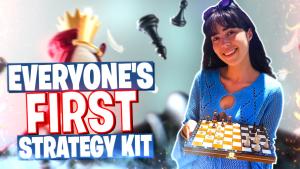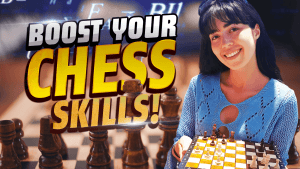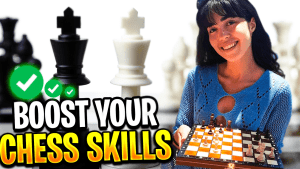
Improving requires targeted strategies depending on your Chess.com rapid rating. Here’s how you can make steady progress:
0-1000: Focus on the BasicsAt this level, mastering the fundamentals is key. - Learn the Rules: Ensure you know ...

Most players (1200-2200 chess.com rating) are strong in tactics and openings, but their ratings don’t show it because their positional knowledge just isn’t up to par. In other words, they can never create the circumstances to exec...

The middlegame is one of the three fundamental parts of every chess game, including the opening and the endgame. Once the initial moves are completed and the players' positions are established, the middlegame begins. Similar to the other parts of ...

If you are an intermediate chess player, the first few moves in a chess game are considered the most crucial moves that most likely predict the middle game quickly as chances of making mistakes get limited. Over the last hundred years, thousands o...

One of the key concepts to master in pawn endgames is the idea of opposition.
What is Opposition?
The opposition, or direct opposition, is a situation where both kings face each other with only one square between them—either on a r...

Most of the players, after finishing their games starts playing another chess game, which is why regardless of playing too many games, it does not improve your tactical and strategical skills quicker. The first step to becoming a better chess play...

As an intermediate chess player, you may have already mastered the basics of tactics and have a good understanding of chess openings. However, there is always room for improvement and further development of your chess skills. This study plan is de...

It can be frustrating to feel stuck at your current skill level, but don't worry – there are steps you can take to overcome this plateau and continue improving. Here are some tips for what to do when you're stuck in a certain chess level:
...

As an intermediate chess player, you may have already mastered the basics of tactics and have a good understanding of chess openings. However, there is always room for improvement and further development of your chess skills. This study plan is de...

Choosing the right chess opening for your playing style can be challenging, as there are many options available. This article discusses two common chess styles: tactical and positional.
First, let's take a look at the different chess styles: tac...

Generally speaking, every focal-point is a weak square in the defender’s territory and a potentially strong one for the attacker.’ This is especially so when such a point is adjacent to the opponent’s king. A focal point is a squ...

Chess is more than just a game - it is a mental exercise that can have numerous benefits for those who study and play it. From strategic thinking and problem-solving skills to patience and discipline, creativity and focus, chess can help players d...

In the chess study plan I present below, I will show you 5 things you can do that will help you improve your chess.
1. Play often and enjoy it!
To improve your chess, you should regularly play against stronger opponents. Playing against weaker...

Tired of tactics? Why not try out our positional puzzles! Depending on the level of each exercise (they are presented in ascending order of difficulty) you will probably need between 5 and 20 minutes to find the solution. If your solution doesn't ...

They say “Pawns are the soul of chess” because they play a significant role from chess opening to the end game. Even losing a single pawn can give your opponent a big material advantage and blunder the entire game. This article is all ...

Most chess players do not know the link between in-game strategy and tactic, and many chess beginners get tangled easily. According to experienced chess players, when a player plans to make strategies during a chess game, it leads to tactical mane...

Chess is a complex and challenging game that requires both strategic thinking and tactical execution. While many people enjoy studying and playing chess, it can be easy to make mistakes that can hinder your progress and understanding of the game. ...

There are many ways to study chess openings, and the best method will depend on your personal preferences and goals. Here are some general tips for studying chess openings:
1) Start with the basics:
If you are new to chess or have not studied ...

With thousands of chess openings to choose from, it can be difficult to decide which one is best for your playing style. In this article, we will discuss the most common chess styles and how to choose the right opening for your game.
First, let'...

When chess players start looking to learn more tactical material to get better in chess, it becomes more challenging for them to choose study plans according to their rating and experience. The middle game in chess is considered an important phase...

Most of the players get exhausted over constant rating and they lose hope after consecutively losing many games. The reason behind not improving is the player’s lack of knowledge about the studies available online. Players who worry about ge...

The best time control for different rating level players depends on their individual preferences and objectives.
Advantages of playing slower time control:
• Allows more time to make proper strategic moves
• Increases the ...

If you are wondering what to learn next here is a chart that can help you to choose topic for your rating level.
1) 0-1000 Tactic (puzzles-pin, fork, checkmating patterns), elementary endgames (checkmating with 2 rooks, checkmating with que...

Most of the players, after finishing their games starts playing another chess game, which is why regardless of playing too many games, it does not improve your tactical and strategical skills quicker. If you want to get better at a certain level, ...

Evaluation of a chess position is all about comparing the progress either side has made. The patterns will emerge quite quickly. One point worth stressing is that good calculation almost invariably requires evaluation, since ve...

























